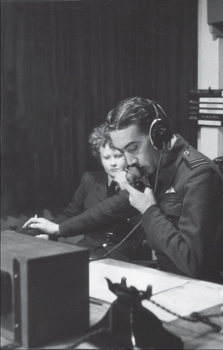Wing Commander Frank Metcalfe CBE
Bomber Command Oboe Controller who later became Director General of the Engineering Industry Training Board, Frank Metcalfe, studied Engineering at Bradford Technical College in the 1930s.
 Born in Shildon, County Durham in 1919, Frank studied
Mechanical Engineering at Bradford Technical College
and attained First Class Honours in his external London
degree.
Born in Shildon, County Durham in 1919, Frank studied
Mechanical Engineering at Bradford Technical College
and attained First Class Honours in his external London
degree.
He joined the RAF in 1939 initially serving with No 82
Squadron as a bomber pilot. In November 1940, when
returning from a raid attacking crucial railways networks
in the Rhine, his air gunner was killed by German fire
and his stricken Blenheim bomber eventually fell into the
sea as it was returning home. Frank and the navigator
managed to escape drowning when their dinghy was
picked up by the destroyer Vega, which was then hit by a
mine. After plastic surgery and 6 months in hospital, the
day after his release he survived a train crash that killed
60 people.
Frank was transferred to Bomber Command
headquarters in 1941.
Professor Alec Reeves had invented a top secret bombing
system, Oboe, in which a radar beam was broadcast in
the direction of the target while another beam tracked
an Oboe-equipped Pathfinder Mosquito bomber. The
Oboe controller back at base then guided the aircraft to
the target with a previously unknown degree of accuracy,
even in conditions of zero visibility. Air Vice-Marshal Don
Bennett made Frank Oboe Controller at Pathfinder Group
HQ and Frank’s meticulous mastery of operations played
a key part in the precision bombing credited with altering
the course and outcome of WWII.
After the Normandy landings Frank led the first ground
station to move inland from the beaches. He was
mentioned in dispatches 3 times and given an Air
Efficiency Award.
After the war Frank became an important figure in
education and technical training. In 1958, he established
the Civic College in Ipswich, which included schools of
art, commerce, engineering, building, science, home
economics and general studies. As Principal he expanded
provision to incorporate new developments in further
education for young people, plus additional facilities for
adult education in music, drama and visual arts. He also
wrote a number of engineering textbooks: Heat Engines
(1960); Applied Thermodynamics (1963) Heat Engines
and Applied Heat (1966).
In 1965 he joined the newly formed Engineering
Industry Training Board as Chief Education and Training
Officer, later becoming Director General. Frank initiated
significant developments in industrial training.
Frank retired in 1978 and that year received the
CBE and an Honorary Doctorate of Technology from
Loughborough University for his contribution to industrial
education. He devoted his time to new responsibilities,
becoming Chairman of the Shipbuilding Training Board
and the Sea Fisheries Training Council.
Ironically for a man who always be remembered for
his pivotal role in ‘Oboe’ one of Frank’s interests in
retirement was making musical instruments, although
these were mostly violins, violas and guitars.
Frank died in March 2002, aged 84.
Photograph courtesy of the Daily Telegraph. Many thanks to David Twiston-Davies of the Telegraph and Jenny Clark, Archivist at the University of Loughborough for their assistance.